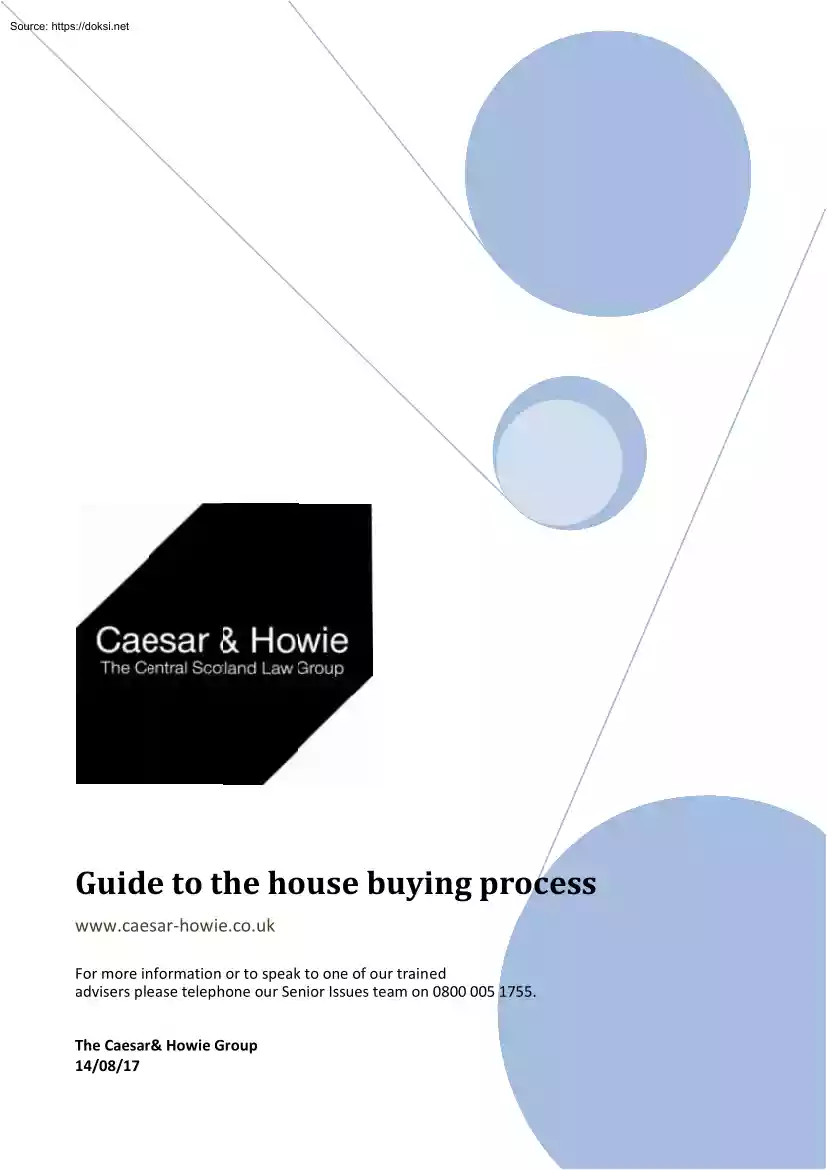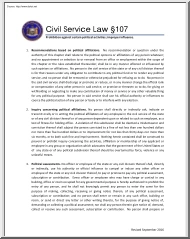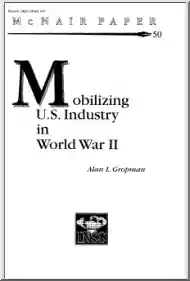Comments
No comments yet. You can be the first!
What did others read after this?
Content extract
Guide to the house buying process www.caesar‐howiecouk For more information or to speak to one of our trained advisers please telephone our Senior Issues team on 0800 005 1755. The Caesar& Howie Group 14/08/17 THE HOUSE BUYING PROCESS 1. Arranging the Finance Before offering to buy a property it is necessary to arrange how to pay the purchase price. This must always be done before offering as once an offer is made it can quite quickly become a binding contract. Caesar & Howie Staff can arrange a loan in principle before clients offer, but occasionally clients make their own loan arrangements. Usually at the stage when the offer is made, whilst the loan is arranged the actual paperwork will not have been fully completed. This is quite normal in Scotland, but immediately you hear from Caesar & Howie that your offer is going to be successful, you should again contact our Mortgage Staff (or the lender direct if you have made your own arrangements) to ensure that all the
necessary steps are quickly taken. If you have any questions, always feel free to contact our staff for advice. Back To Top 2. The Offer to Purchase The ‘Offer’ is in fact a letter from Caesar & Howie to the selling solicitors offering to buy the property at a certain price and on certain conditions. There are usually about thirty conditions These conditions are designed to make the seller reveal as much as possible about the status of the property and his right to sell it. For example, we will ask the seller to confirm that there are not at this time, any planning proposals outstanding which might affect the property. At this stage, the buyer will not have signed the offer; it is signed by Caesar & Howie as agents for the client. Usually very shortly after the offer has been submitted, the seller’s solicitors will telephone to advise whether or not the offer is ‘going to be successful’. However, the offer only becomes legally binding when the seller’s solicitors
and Caesar & Howie have adjusted in letters between them what conditions will actually be in the final contract. For example, the seller’s solicitor might not agree to some of the conditions we put in the offer and he may also wish to add in some other conditions. It is just a matter of agreeing what parties, buyer and seller, want to have in the final contract. This process might take a few weeks When the conditions are all agreed then we have reached the stage of what is called ‘concluded missives’. This means that both parties are legally bound to proceed with the transaction and to meet the conditions imposed on them in these letters or ‘missives’ between the solicitors. Once this stage is reached, very few transactions go wrong, but it is still possible for some not to proceed where, for example, on checking the seller’s title (which can often only be done after ‘conclusion of missives’) there is some defect found. For example it might be that the seller does
not own all of the property he is trying to sell and this may only become clear on close checking of the title. However, once the stage of ‘concluded missives’ is achieved only a very small proportion of transactions do not go ahead normally. We will advise you when the concluded missives stage is reached Back To Top 3. Date of Entry or "Settlement" The ’date of entry’ is the day the purchaser becomes the legal owner of the property on payment of the price. It is usually about eight weeks after the offer but it can be longer or shorter. The ‘date of entry’ is sometimes known as the ‘settlement’ date. This date is in fact included as one of the conditions in the offer Usually, we as solicitors for the purchaser will send the full purchase price to the seller’s solicitor the day before the date of entry and the keys will be made available from the seller’s solicitor’s office or some other convenient place reasonably early on Page 2 THE HOUSE BUYING
PROCESS the morning of the date of entry. In the vast majority of transactions the date of entry is adhered to by both parties but on occasion there can be delays. On the few occasions when this arises, the solicitor or legal executive handling your case would normally be able to give you prior notice of potential delays. If both the buyer and seller agree the date of entry in the offer it can be changed either before or after the ‘concluded missives’ stage. Back To Top 4. Checking the Seller's Title Once the ‘concluded missives’ stage is reached, the seller’s solicitor will send all the documents relating to the ownership of the property to us. These are called ‘documents of title’ Caesar & Howie staff will then check these documents to ensure that the seller does indeed own the property and that there is nothing to prevent the contract proceeding to the ‘settlement’. In Scotland, most land is held under a system which results in the titles to property
containing ‘conditions of title’ affecting the property. The vast majority of these conditions are quite acceptable to purchasers of residential property and Caesar & Howie will advise you of the conditions which affect your particular property. Very often there is a prohibition against using a residential property for commercial purposes or altering buildings without certain consents. You will be shown these title conditions and if you have any questions about them, you can direct them to the solicitor or legal executive responsible for your transaction. Back To Top 5. The Conveyancing "Conveyancing" is the general word used to describe the procedures gone through to prepare the written document transferring ownership to the buyer. This document is called the ‘Disposition’ and Caesar & Howie will ensure that this document accurately transfers the property to the buyer. That Disposition is signed by the seller but the seller’s solicitor keeps it, only
delivering it to Caesar & Howie in return for the purchase price at the date of entry or settlement. That Disposition, when it is received by us must be recorded in the ‘Land Register’ which is the public register into which all Scottish land transfers must be entered. This means that after the date of entry you will not as a buyer actually receive the document of title in your favour but you become the true owner of the property when that document is recorded by us in the Land Register. When you are buying property with a loan, once the Disposition is returned to us after having been recorded in the Register then it is often held by the lender until the loan is repaid. If you wish, however, we can easily provide you with a copy of the document in your favour. Back To Top 6. The Loan Offer At some stage between conclusion of missives and the date of entry your lender (if you have a loan) will send you a formal offer to lend you the money agreed as a loan to help you to buy the
property. Normally, the loan offer will contain in it the various conditions on which the loan has been granted, including the amount of the monthly payments. Not all lenders’ procedures are the same, but usually you will have to sign an acceptance of this loan offer and return it to the lender. At that stage we will prepare various other documents for your signature, the main one being the ‘Standard Security’. In simple terms, this is a document signed by all buyers who are Page 3 THE HOUSE BUYING PROCESS borrowing to buy and this document gives the lender the right to take ownership of the property from the buyer if the buyer breaches his or her loan conditions. The Standard Security is recorded in the Land Register along with the Disposition in favour of the purchaser and it effectively prevents the purchaser selling the property without at the same time repaying the loan due to the lender. Back To Top 7. Paying the Purchase Price Shortly before the date of entry, Caesar
& Howie will request or ‘requisition’ the loan cheque from the lender, if Caesar & Howie are satisfied that the seller is entitled to sell and that ownership can be transferred on the scheduled date of entry. At that point also we would ask you for any deposit payable towards the purchase price, the legal fees due and stamp duty if payable. These cheques are paid to Caesar & Howie and we will issue our firm’s cheque to the seller’s solicitor, this being sent or delivered strictly in exchange for the document transferring the property to the buyer and also in exchange for the keys. Back To Top 8. Your Mortgage Payment To allow for clearance of cheques, we will normally request the lender’s cheque a few days before the date of entry. Once that cheque is issued by the lender, the lender will automatically contact you regarding mortgage repayments. Most lenders will send standing orders together with details of the amounts requested and the payment dates. Payment
dates can be altered to some extent to suit the purchaser’s wages or salary payments and if in doubt you should ask advice from the solicitor or legal executive handling your transaction. Back To Top 9. Paying the Fees You will receive a note of our fees and also the various costs we have to pay on your behalf. For example, we will have to pay dues to the Government for recording in the Register the document transferring the property to you. If there have been Making of payments received by us and made by us on your behalf in the course of your transaction you may also receive a ‘State for Settlement’ which is simply a record of these transactions together with a note of how much is due to us at the end of the day. Methods of payment will be explained and time for payment can be granted in certain circumstances if requested. The solicitor or executive dealing with your transaction will give you any details you require. Back To Top 10. Making Your Will At the end of this
transaction you will be a property owner and it is desirable for all property owners to prepare a Will outlining how his or her whole estate (including the property purchased) should be dealt with in the event of death. Apart from the desirability of stating how the property is to be dealt with, a Will can generally save time and expense in dealing with a deceased’s estate on death. Please ask the solicitor or executive dealing with your Page 4 THE HOUSE BUYING PROCESS transaction about our Wills service. Back To Top 11. Our Continuing Service We attempt at Caesar & Howie, to provide the best possible service to our clients. Please feel free at any stage to telephone us to discuss any matter. Page 5
necessary steps are quickly taken. If you have any questions, always feel free to contact our staff for advice. Back To Top 2. The Offer to Purchase The ‘Offer’ is in fact a letter from Caesar & Howie to the selling solicitors offering to buy the property at a certain price and on certain conditions. There are usually about thirty conditions These conditions are designed to make the seller reveal as much as possible about the status of the property and his right to sell it. For example, we will ask the seller to confirm that there are not at this time, any planning proposals outstanding which might affect the property. At this stage, the buyer will not have signed the offer; it is signed by Caesar & Howie as agents for the client. Usually very shortly after the offer has been submitted, the seller’s solicitors will telephone to advise whether or not the offer is ‘going to be successful’. However, the offer only becomes legally binding when the seller’s solicitors
and Caesar & Howie have adjusted in letters between them what conditions will actually be in the final contract. For example, the seller’s solicitor might not agree to some of the conditions we put in the offer and he may also wish to add in some other conditions. It is just a matter of agreeing what parties, buyer and seller, want to have in the final contract. This process might take a few weeks When the conditions are all agreed then we have reached the stage of what is called ‘concluded missives’. This means that both parties are legally bound to proceed with the transaction and to meet the conditions imposed on them in these letters or ‘missives’ between the solicitors. Once this stage is reached, very few transactions go wrong, but it is still possible for some not to proceed where, for example, on checking the seller’s title (which can often only be done after ‘conclusion of missives’) there is some defect found. For example it might be that the seller does
not own all of the property he is trying to sell and this may only become clear on close checking of the title. However, once the stage of ‘concluded missives’ is achieved only a very small proportion of transactions do not go ahead normally. We will advise you when the concluded missives stage is reached Back To Top 3. Date of Entry or "Settlement" The ’date of entry’ is the day the purchaser becomes the legal owner of the property on payment of the price. It is usually about eight weeks after the offer but it can be longer or shorter. The ‘date of entry’ is sometimes known as the ‘settlement’ date. This date is in fact included as one of the conditions in the offer Usually, we as solicitors for the purchaser will send the full purchase price to the seller’s solicitor the day before the date of entry and the keys will be made available from the seller’s solicitor’s office or some other convenient place reasonably early on Page 2 THE HOUSE BUYING
PROCESS the morning of the date of entry. In the vast majority of transactions the date of entry is adhered to by both parties but on occasion there can be delays. On the few occasions when this arises, the solicitor or legal executive handling your case would normally be able to give you prior notice of potential delays. If both the buyer and seller agree the date of entry in the offer it can be changed either before or after the ‘concluded missives’ stage. Back To Top 4. Checking the Seller's Title Once the ‘concluded missives’ stage is reached, the seller’s solicitor will send all the documents relating to the ownership of the property to us. These are called ‘documents of title’ Caesar & Howie staff will then check these documents to ensure that the seller does indeed own the property and that there is nothing to prevent the contract proceeding to the ‘settlement’. In Scotland, most land is held under a system which results in the titles to property
containing ‘conditions of title’ affecting the property. The vast majority of these conditions are quite acceptable to purchasers of residential property and Caesar & Howie will advise you of the conditions which affect your particular property. Very often there is a prohibition against using a residential property for commercial purposes or altering buildings without certain consents. You will be shown these title conditions and if you have any questions about them, you can direct them to the solicitor or legal executive responsible for your transaction. Back To Top 5. The Conveyancing "Conveyancing" is the general word used to describe the procedures gone through to prepare the written document transferring ownership to the buyer. This document is called the ‘Disposition’ and Caesar & Howie will ensure that this document accurately transfers the property to the buyer. That Disposition is signed by the seller but the seller’s solicitor keeps it, only
delivering it to Caesar & Howie in return for the purchase price at the date of entry or settlement. That Disposition, when it is received by us must be recorded in the ‘Land Register’ which is the public register into which all Scottish land transfers must be entered. This means that after the date of entry you will not as a buyer actually receive the document of title in your favour but you become the true owner of the property when that document is recorded by us in the Land Register. When you are buying property with a loan, once the Disposition is returned to us after having been recorded in the Register then it is often held by the lender until the loan is repaid. If you wish, however, we can easily provide you with a copy of the document in your favour. Back To Top 6. The Loan Offer At some stage between conclusion of missives and the date of entry your lender (if you have a loan) will send you a formal offer to lend you the money agreed as a loan to help you to buy the
property. Normally, the loan offer will contain in it the various conditions on which the loan has been granted, including the amount of the monthly payments. Not all lenders’ procedures are the same, but usually you will have to sign an acceptance of this loan offer and return it to the lender. At that stage we will prepare various other documents for your signature, the main one being the ‘Standard Security’. In simple terms, this is a document signed by all buyers who are Page 3 THE HOUSE BUYING PROCESS borrowing to buy and this document gives the lender the right to take ownership of the property from the buyer if the buyer breaches his or her loan conditions. The Standard Security is recorded in the Land Register along with the Disposition in favour of the purchaser and it effectively prevents the purchaser selling the property without at the same time repaying the loan due to the lender. Back To Top 7. Paying the Purchase Price Shortly before the date of entry, Caesar
& Howie will request or ‘requisition’ the loan cheque from the lender, if Caesar & Howie are satisfied that the seller is entitled to sell and that ownership can be transferred on the scheduled date of entry. At that point also we would ask you for any deposit payable towards the purchase price, the legal fees due and stamp duty if payable. These cheques are paid to Caesar & Howie and we will issue our firm’s cheque to the seller’s solicitor, this being sent or delivered strictly in exchange for the document transferring the property to the buyer and also in exchange for the keys. Back To Top 8. Your Mortgage Payment To allow for clearance of cheques, we will normally request the lender’s cheque a few days before the date of entry. Once that cheque is issued by the lender, the lender will automatically contact you regarding mortgage repayments. Most lenders will send standing orders together with details of the amounts requested and the payment dates. Payment
dates can be altered to some extent to suit the purchaser’s wages or salary payments and if in doubt you should ask advice from the solicitor or legal executive handling your transaction. Back To Top 9. Paying the Fees You will receive a note of our fees and also the various costs we have to pay on your behalf. For example, we will have to pay dues to the Government for recording in the Register the document transferring the property to you. If there have been Making of payments received by us and made by us on your behalf in the course of your transaction you may also receive a ‘State for Settlement’ which is simply a record of these transactions together with a note of how much is due to us at the end of the day. Methods of payment will be explained and time for payment can be granted in certain circumstances if requested. The solicitor or executive dealing with your transaction will give you any details you require. Back To Top 10. Making Your Will At the end of this
transaction you will be a property owner and it is desirable for all property owners to prepare a Will outlining how his or her whole estate (including the property purchased) should be dealt with in the event of death. Apart from the desirability of stating how the property is to be dealt with, a Will can generally save time and expense in dealing with a deceased’s estate on death. Please ask the solicitor or executive dealing with your Page 4 THE HOUSE BUYING PROCESS transaction about our Wills service. Back To Top 11. Our Continuing Service We attempt at Caesar & Howie, to provide the best possible service to our clients. Please feel free at any stage to telephone us to discuss any matter. Page 5





